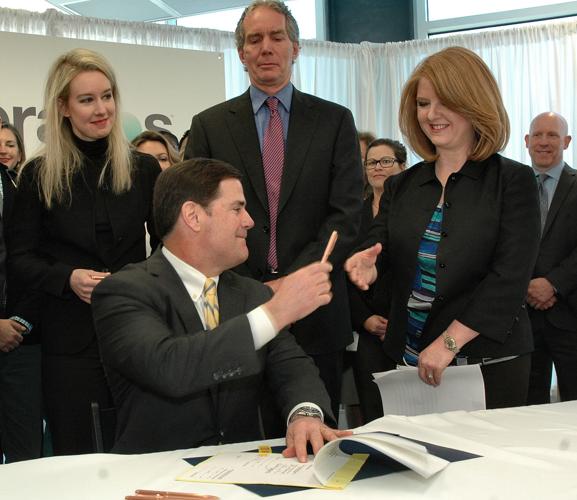PHOENIX — A laboratory testing firm that successfully pushed for changes in state law is being sued by an Arizona resident who charges its practices amount to consumer fraud.
Casey Jones charges in legal papers filed Thursday in federal court in California that he went to Theranos for blood tests based at least in part on their claims of providing accurate results with minimal blood draw. But attorneys for Jones said it turns out none of that is true, with Theranos even having to disavow the results of more than a year’s worth of tests.
The lawsuit comes a year after Gov. Doug Ducey signed legislation designed to make it easier for Theranos to market its services to Arizona consumers. That measure removed all the limits on the kinds of blood, urine and other tests that patients can order for themselves.
Ducey’s action is noted in the legal arguments, with attorney Rob Carey saying that the company “worked closely with leaders in Arizona.”
“Its assistance came from the top: Arizona Gov. Doug Ducey wholeheartedly adopted Theranos’ claims and pressed to change the law for Theranos to do business,” the lawsuit states.
And Ducey, in signing the measure at a ceremony at the company’s Scottsdale offices, said he was “proud to sign” legislation for “reducing burdensome barriers and red tape.”
Asked Thursday about the lawsuit, Ducey sidestepped questions of whether it was a mistake to change Arizona law. Instead, he cited Chief Executive Magazine moving Arizona up in its list of the best states to do business.
“You can see we’re doing the things that have companies moving here, making investments here,” Ducey said, allowing only that “there are going to be companies that do well and there are going to be companies that have issues.”
Carey said there was nothing necessarily wrong with Ducey signing legislation allowing patients to get lab tests without a doctor’s order. But Carey said that Ducey was wrong to hold out Theranos as an example of the advantages to consumers given that the governor could have learned that the company did not actually have the technology promised to provide accurate results.
“I think the heart was in the right place,” Carey said of the governor. “But I probably would think he was duped.”
The issues in this case come down to the claim by Carey that Jones did not get what he was promised.
First, Carey said, Theranos advertised “minimally invasive” testing, promoting what it said was its ability to get results with a finger prick and not blood drawn from a vein.
More to the point, Carey said Jones — and others he hopes to represent in a class action lawsuit — were promised accurate results.
After undergoing the tests and getting results, Carey said Jones began reading reports about problems with Theranos testing. The company also voided prior test results and is under investigation by the Centers for Medicare and Medicaid Services, the Securities and Exchange Commission, and the Department of Justice.
Theranos spokeswoman Brooke Buchanan called the lawsuit “without merit.” ”The company will vigorously defend itself against these claims,” she said.
Carey acknowledged that Jones has no actual proof that the lab results he got were inaccurate. But the attorney said that’s not legally necessary to sue.







